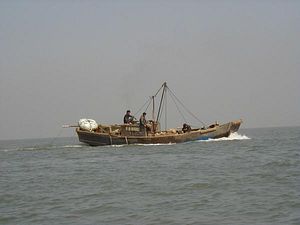Two Chinese boats illegally fishing in South Korean waters rammed and sank a Korea Coast Guard vessel on October 9, after which several nearby Chinese ships closed in, armed with spearlike metal rods, until another coast guard vessel arrived and fired at the boats with an assault rifle and a grenade launcher.
South Korean authorities are naturally seeing red. Lee Chun-jae, vice commissioner of the Korea Coast Guard, said this week, “we will employ all means possible [to defend Korean waters], including using our patrol ships to ram Chinese vessels.”
Beijing’s flippant response was to tell Seoul it must remain “reasonable and cool-headed,” but South Korea isn’t the only nation facing modern Chinese piracy. The Vietnamese daily Tuoi Tre News reported on July 11, “Two Vietnamese fishing boats were attacked, one of which was sunk, by two Chinese vessels while operating in Vietnam’s own waters on Saturday.”
Neither is Korea the only nation to authorize deadly force in handling the issue. In March, the Argentine Naval Prefecture (PNA), which functions as the nation’s coast guard, shot at and sank a Chinese fishing vessel. The PNA later reported, “On several occasions, the offending ship performed maneuvers designed to collide with the Prefecture coast guard, putting at risk not only the life of its own crew but also coast guard personnel.”
Since taking office in October 2014, Indonesian President Joko “Jokowi” Widodo has cracked down on illegal fishing by exploding 230 captured ships, including Chinese boats. Prashanth Parameswaran, associate editor at The Diplomat, writes, “In Jokowi’s view, Jakarta can no longer tolerate a situation where over 5,000 ships operate illegally in its waters every day, making a mockery out of Indonesian sovereignty and resulting in annual losses of over $20 billion.”
Yet Chinese media seem treat the issue dismissively. Global Times observed that on October 10, the Korean Broadcasting System (KBS) labeled China “the world’s fishing enemy,” calling it a report “exaggerated to discredit Chinese fishermen.” Other Chinese reports have taken exception to such fishermen being deemed “pirates” — as in this YTN newscast or this Yeongnam Ilbo column — never mind that even the simplest definition of “piracy” includes violence by one ship upon another.
Beijing isn’t sitting on its hands, thankfully. The Chinese coast guard is stepping up its efforts to combat piracy and illegal fishing, including by working with the U.S. coast guard in August. Zhao Xingwu, head of the Bureau of Fisheries under the Ministry of Agriculture, said in May, “We will definitely step up law enforcement in the South China Sea to enhance regulation of our fishing vessels.”
But given the sheer magnitude of Chinese illegal fishing, even these efforts will scarcely help Beijing get its arms around the problem. The U.N. Food and Agriculture Organization’s data show that China’s captured fish went from 880,139 metric tons in 1950 to over 8 million by 1992 to hit 17.3 million by 2014. And as China’s harvest grows, so do interactions with foreign coast guards.
Also, for all Beijing’s talk, it remains to be seen how much actual policing is being done. Siddharth Chakravarty, for instance, a ship captain and member of the Sea Shepherd Conservation Society, told the South China Morning Post in May that his crew enjoys “a constructive line of communication with the Chinese authorities,” but added, “what the reality is, I really don’t know,” explaining that he senses a disconnect between crime scenes, which are often thousands of miles from China, and Beijing’s regulatory authorities.
This skepticism is given weight by Tom Plate, who describes his meeting with a Chinese diplomat from the Ministry of Foreign Affairs, in which he asks why China hasn’t tossed neighboring nations a few concessions in its maritime relations. The answer, Plate concludes, is nationalism. He writes, “China’s problem is less with neighboring nations than its own people. Its foreign relations are fueled more by domestic pressures than by logical interactions with neighbors.”
In other words, when it comes to illegal fishing and piracy, Beijing isn’t incompetently fumfering about nor is it trying to stick a finger in the eye of its trade allies. It’s walking a tightrope, balancing foreign relations in one hand and the nationalism of its own people in the other. This is no easy balancing act, to be sure, but the way forward seems clear. Beijing must stop fanning the flames of nationalist sentiment — its neighbors’ homes are already catching fire.

































